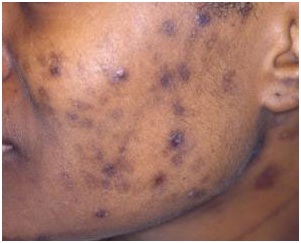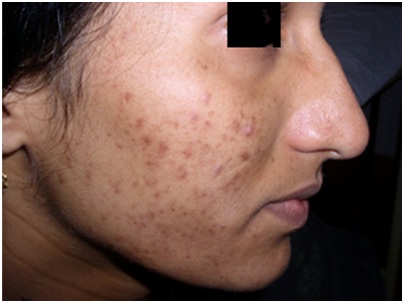

Post Inflammatory Hyperpigmentation Treatments
Even after pimples have healed, they may leave dark pink, red, brown, or purplish spots, called post-inflammatory hyperpigmentation (PIH), on your skin. These PIH spots are your skin's reaction to an inflammatory injury (like inflamed pimples). PIH will fade over time. But because it can make you feel self-conscious about your skin, you may choose to treat it.
Post Inflammatory Hyperpigmentation (PIH) Treatments
Before you begin treatment, your acne should be under control, or at least being treated.
Otherwise, each new pimple could cause another PIH macule, reducing the effectiveness of treatment. Try to use sunscreen daily. The sun may darken the discolorations and increase fading time.
Be sure to monitor your skin for irritation. Although they are helping you clear your skin, acne treatments also have the potential for causing irritation. Unfortunately,irritated skin could lead to PIH. If post inflammatory hyperpigmentation is a problem for you, let your dermatologist know if your skin becomes irritated from your acne treatments. Whatever treatment option you choose, understand that improvement will take time. Think in terms of months rather than weeks.
When you're ready to begin treatment, you have plenty of options. Remember, this isn't a comprehensive list. Other treatments may be available. Your dermatologist can help guide you to the right treatment for your skin.
What's the difference between acne marks versus acne scars ?
In order to treat acne marks and scars, it's helpful to learn how to distinguish between the two. "Patients often mistake dark spots for acne scars but they're actually very different,
True acne scars, however, are permanent indentations from collagen damage and can come in many shapes and forms.
Alpha Hydrodxy Acids (AHAs)
Alpha hydroxy acids, especially glycolic acid, are a good starting point for PIH treatment. Alpha hydroxy acids (AHAs) help speed up the skin's natural exfoliation process, which can help improve the appearance of PIH.
Many over-the-counter cleansers, lotions, creams, and gels contain AHAs.
These may be a good choice if hyperpigmentation is fairly mild. Stronger AHA treatments are available with a prescription. AHAs are often used as anti-aging treatments too, and will leave your skin super soft and smooth.
Topical Retinoids
Topical retinoids are often prescribed to acne patients. Retinoids help clear acne by speeding up cell turnover rates. This rapid exfoliation can also help fade PIH.
Retinoid creams include Retin-A (tretinoin), Tazorac (tazarotene), and Differin (adapalene). The fact that they lessen post inflammatory hyperpigmentation as they treat acne breakouts is an added benefit for many people. These medications are available with a prescription only.
Topical vitamin C serum
Vitamin C can help build collagen and promotes healing.
Skin lighteners
For marks that are more brownish in color, skin lightening ingredients like retinol, vitamin C, hydroquinone, kojic acid, or licorice could help.
Procedural Treatments
PIH can also be treated professionally by your dermatologist. Procedural treatments include various chemical peels and microdermabrasion.
But just one treatment isn't enough to fade PIH. Most likely you'll need a series of treatments spaced a week or so apart (depending on the procedure you're having done). Your doctor can help determine which of these treatments, if any, would be most effective for you.